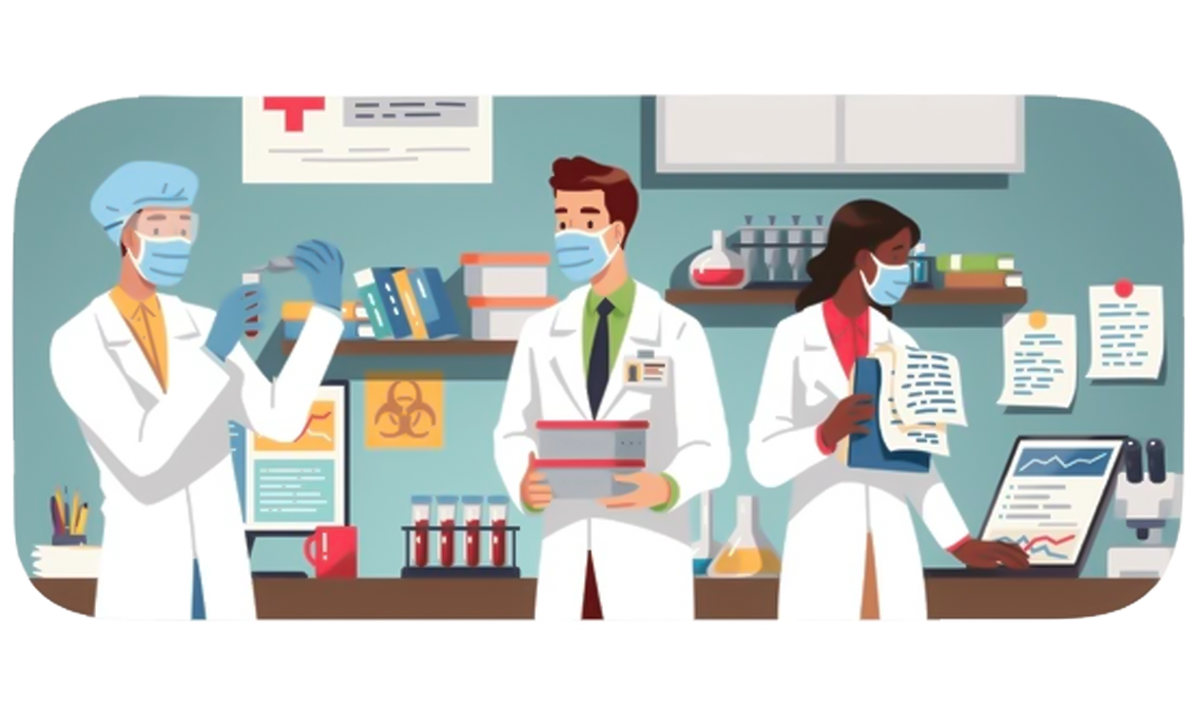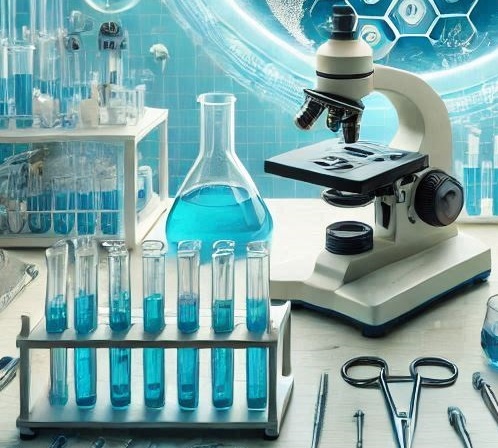This Course Structure is Curated as per the NEP-2020 Guidelines
Course Overview
The B.Sc. Medical Lab Technology (MLT) program at Malla Reddy Vishwavidyapeeth, Hyderabad, is an undergraduate course designed to train students to assist healthcare teams by performing essential laboratory tests used for diagnosing and treating diseases.
This program focuses on equipping students with the theoretical knowledge and hands-on skills from 1st semester itself. The curriculum provides in-depth knowledge and technical expertise in clinical biochemistry, microbiology, hematology, immunology, and molecular diagnostics. Students gain practical experience in operating advanced laboratory equipment, adhering to quality assurance protocols, and interpreting diagnostic data, ensuring they are well-prepared to support healthcare professionals in delivering accurate diagnostic information.
Graduates of this program emerge as ‘Skilled Medical Lab Technologists’, enabling them to pursue further higher studies and conduct research in Medical Laboratory Technology, along with plenty of job opportunities globally in hospitals, diagnostic laboratories, and research institutions.

Course Details
Description: 4 Years Degree Program
No. of Seats: 40
No. of Credits: 160 minimum & as specified
- Eligibility
- Curriculum Structure
- Program Outcomes
- Career Enhancement
- Higher Studies
- Job Roles & Progression
The minimum eligibility for B.Sc. Medical Lab Technology is a pass in 10+2 with at least 50% in Physics, Chemistry and Biology from a recognized board (CBSE/ISC) or equivalent.
| Semester | Name of the Subject |
| Semester 1 | Basics of Human Anatomy, Physiology – I Fundamentals of Lab Technology Biochemistry – I English – I English & Communication Skills Practical: Anatomy & Physiology – I |
| Semester 2 | Microbiology – I Biochemistry – II Pathology – I Introduction to Hematology English – II Practical: Biochemistry & Hematology |
| Semester 3 | Advanced Microbiology Immunology Clinical Biochemistry – I Hematology – II Communicative English Healthcare Administration |
| Semester 4 | Clinical Biochemistry – II Advanced Hematology Blood Banking and Transfusion Science Practical – Pathology & Biochemistry Project Centric Learning (PCL) |
| Semester 5 | Clinical Pathology Histopathology Quality Assurance in Laboratory Practical – Clinical Lab Techniques, Internship |
| Semester 6 | Molecular Diagnostics Advanced Microbiology Techniques Laboratory Management Practical – Advanced Lab Techniques Internship |
| Semester 7 & 8 | On-Job Training and Internship Thesis work |
- Sample Collection and Preparation: Collecting, labeling, and preparing blood, urine, and tissue samples for analysis.
- Diagnostic Testing and Analysis: Performing biochemical, microbiological, hematological, and immunological tests.
- Laboratory Safety and Infection Control: Adhering to safety protocols to prevent contamination and ensure accurate results.
- Quality Control: Monitoring test procedures and results for consistency and accuracy.
- Data Management: Recording and maintaining laboratory test data and reports.
Graduates of B.Sc. Medical Lab Technology can expand their skills through specialized certifications and advanced training programs:
- Certification in Molecular Diagnostics: Focused on modern diagnostic techniques like PCR, DNA sequencing, and genetic testing.
- Certification in Clinical Biochemistry: Advanced skills in biochemical analysis, ideal for specialized roles in biochemistry labs.
- Quality Assurance in Clinical Labs Certification: Ensures adherence to high standards in laboratory testing and reporting.
- Blood Banking and Transfusion Science Certification: Specialized training in blood collection, testing, and safe transfusion practices.
- Infection Control and Safety Certification: Focuses on maintaining a sterile environment and preventing contamination in the lab.
- Master’s in Medical Lab Technology
- Postgraduate Diploma in Molecular Diagnostics
- MBA in Healthcare Management
- Ph.D. in Clinical Laboratory Sciences
- Certification in Advanced Diagnostic Techniques
| Duration | Roles and Responsibilities | Salary Range |
| 0-3 years | Lab Technician, Clinical Lab Assistant | ₹3,00,000 – ₹5,00,000 per annum |
| 3-5 years | Senior Lab Technologist, Biochemistry Specialist | ₹5,00,000 – ₹8,00,000 per annum |
| 5-10 years | Lab Supervisor, Quality Control Manager | ₹8,00,000 – ₹12,00,000 per annum |
| 10+ years | Director of Laboratory Services, Chief Lab Technologist | ₹12,00,000+ per annum |
Note: Salaries vary based on experience, location, and type of healthcare institution.

Fee Structure Per Academic Year - 2025
| Tuition Fee | Miscellaneous Fee | Scholarship | |||
| 100000₹ | 10000 ₹ | Above 95% – 100000 ₹ | Above 91% – 50000 ₹ | Between 81-90% – 10000 ₹ | Between 71-80% – 5000 ₹ |
| Tuition Fee | Miscellaneous Fee | Scholarship | ||
| 100000 ₹ | 10000 ₹ | Above 90% – 20000 ₹ | Between 80-90% – 10000 ₹ | Between 70-80% – 5000 ₹ |




